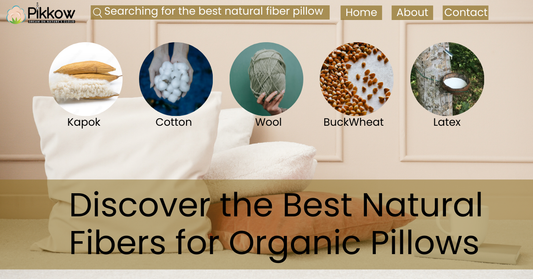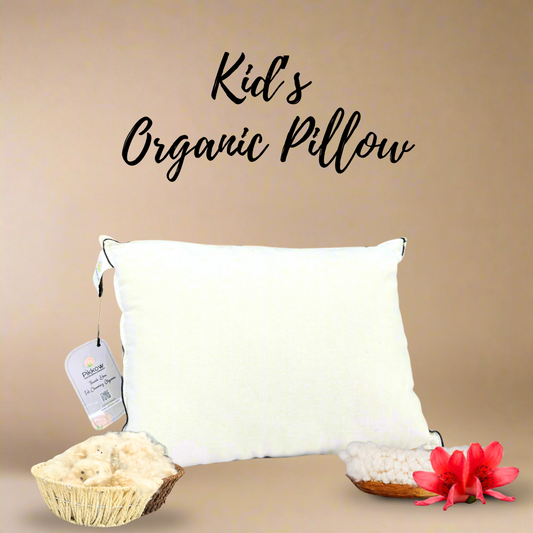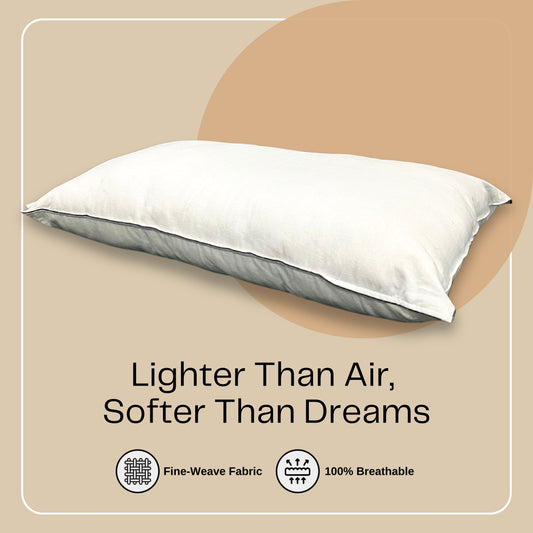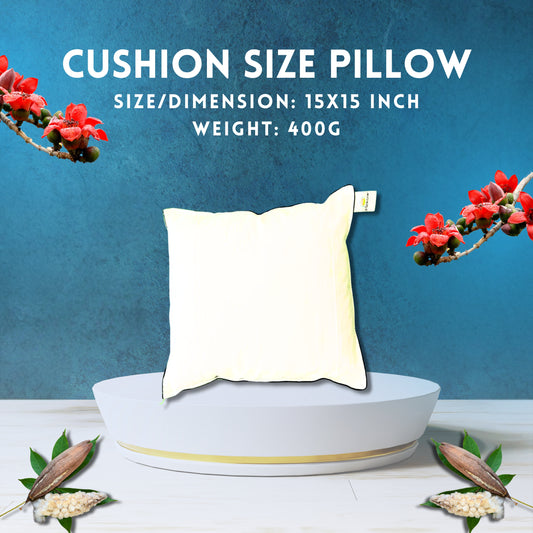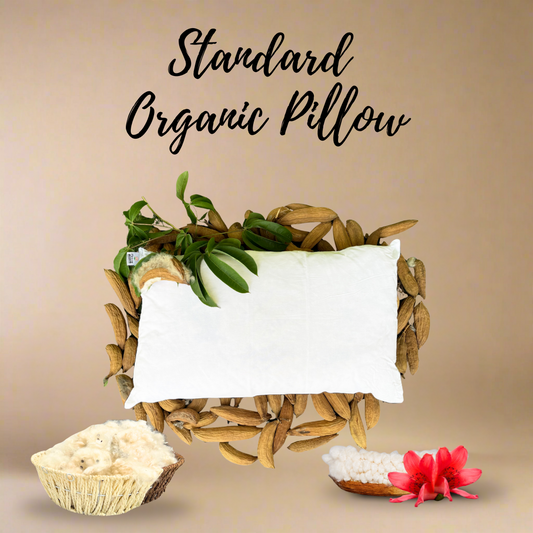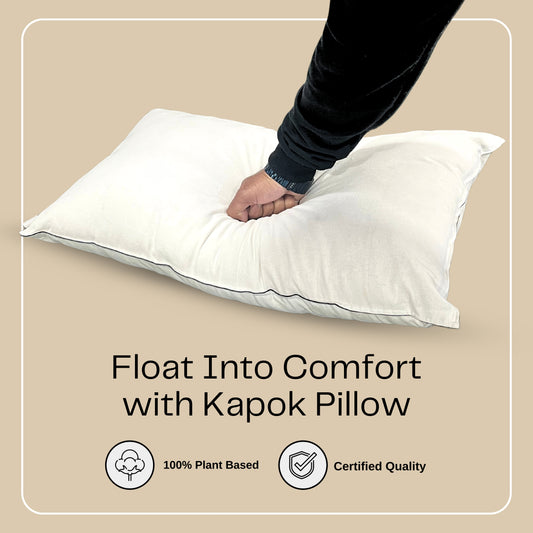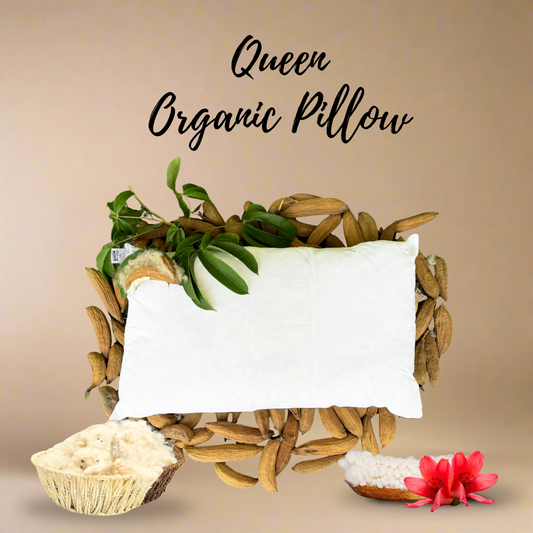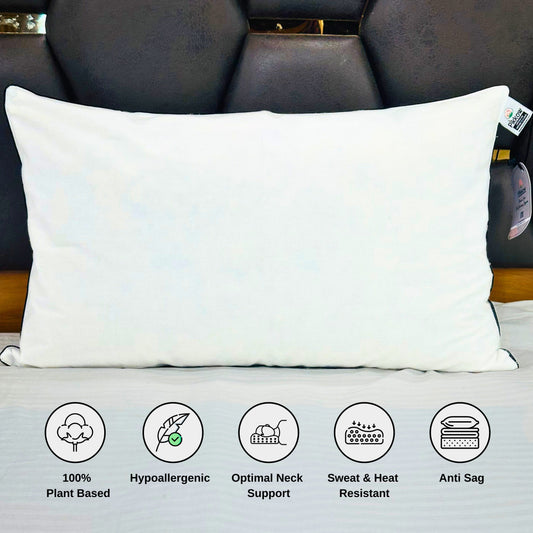When it comes to choosing the perfect pillow, most people go for softness. A plush, cushiony pillow feels luxurious — but does softness alone guarantee better sleep?
The truth is, breathability matters far more than softness. While a soft pillow may feel cozy initially, a breathable pillow ensures long-lasting comfort, optimal airflow, and temperature balance throughout the night. Let’s explore the scientific side of breathable pillow benefits and understand how natural fiber pillows, especially kapok, excel in creating the perfect cooling sleep solution.
The Science Behind Sleep: Why Airflow Matters
While you sleep, your body naturally cools down. This drop in temperature helps trigger deeper sleep cycles. However, pillows that trap heat can disturb this process, leading to discomfort and poor sleep quality.
Here’s what happens when airflow is restricted in your bedding:
- Heat gets trapped, raising body temperature.
- Excess moisture causes sweating and restlessness.
- Interrupted sleep cycles lead to fatigue and irritability.
That’s why maintaining proper airflow in bedding is crucial — it keeps your body cool, supports healthy sleep rhythms, and prevents overheating.
What Makes a Pillow “Breathable”?
A breathable pillow allows continuous airflow through its fibers, preventing heat and moisture from getting trapped inside.
In simple terms:
Good airflow = cooler surface = deeper, healthier sleep.
|
Factor |
Low Breathability Pillow |
High Breathability Pillow |
|
Air Circulation |
Restricted, traps heat |
Continuous airflow, stays cool |
|
Moisture Absorption |
High, leads to sweating |
Wicks away moisture |
|
Comfort Duration |
Feels hot after a while |
Feels cool all night |
|
Material Type |
Synthetic foam, dense fills |
Kapok, cotton, bamboo fibers |
Choosing a pillow with natural, breathable materials creates an environment where your skin can breathe and your sleep can truly recover.
The Misconception: Why Softness Isn’t Always Better
Softness may feel luxurious, but too much of it can actually make your sleep worse. Here’s why:
- Traps Heat: Overly soft pillows restrict airflow, causing warmth and humidity buildup.
- Lacks Support: Excessive plushness fails to maintain proper neck alignment.
- Harbors Moisture: Dense materials absorb sweat and retain odor.
In contrast, a moderately soft yet breathable pillow ensures airflow, balanced comfort, and long-lasting freshness.
Key Breathable Pillow Benefits
If you’ve ever woken up sweaty or restless, your pillow might be to blame. Switching to a breathable pillow can transform your sleep quality.
Top Breathable Pillow Benefits:
- Temperature Control: Promotes a cooler sleep by improving airflow.
- Moisture Reduction: Prevents sweat and humidity buildup.
- Deeper Sleep: Supports your body’s natural cooling process.
- Hygienic Sleep Environment: Limits dust, bacteria, and odor.
- Durability: Natural ventilation keeps fibers fresh and bouncy longer.
By choosing the right pillow, you’re not just buying comfort — you’re investing in healthier, more restorative sleep.
Natural Fiber Pillows: Nature’s Cooling Solution
Synthetic pillows like memory foam often feel soft but can trap body heat due to their dense structure. On the other hand, natural fiber pillows — such as kapok, bamboo, and organic cotton — provide superior airflow and moisture regulation.
Why Choose Natural Fiber Pillows:
- Made from breathable, plant-based fibers.
- Naturally hypoallergenic and chemical-free.
- Maintain temperature balance through natural ventilation.
- Biodegradable and eco-friendly — gentle on both you and the planet.
If you’re looking for cooling sleep solutions, natural fiber options outperform synthetics in comfort, sustainability, and breathability.
Kapok: The Champion of Natural Breathability
Among all natural fibers, kapok stands out as a revolutionary material for breathable pillows. Derived from the seed pods of the Ceiba tree, kapok fiber is naturally hollow, lightweight, and silky soft — making it perfect for airflow and comfort.
What Makes Kapok Pillows Unique:
|
Feature |
Kapok Pillow Advantage |
|
Air Circulation |
Naturally hollow fibers enhance airflow |
|
Temperature Control |
Stays cool even in humid conditions |
|
Moisture Resistance |
Repels sweat and humidity |
|
Eco-Friendliness |
100% biodegradable and chemical-free |
|
Soft Support |
Offers gentle cushioning without sinking |
Kapok delivers the best of both worlds — plush comfort and breathable support. It’s the ultimate cooling sleep solution for those who struggle with heat or sweat during the night.
How to Choose the Right Breathable Pillow
When selecting a pillow, balance comfort with breathability. Here’s a quick guide to help you pick wisely:
Checklist for the Perfect Breathable Pillow:
- Go Natural: Choose fillings like kapok, bamboo, or cotton.
- Avoid Dense Foam: Stay away from heat-trapping synthetics.
- Look for Removable Covers: Cotton or bamboo covers enhance ventilation.
- Check Certifications: Opt for GOTS or OEKO-TEX certified organic materials.
- Test Airflow: Lightly press and feel — the best pillows regain shape and stay airy.
A breathable pillow isn’t just about cool sleep; it’s about giving your body the right environment to heal, relax, and recharge every night.
Final Thoughts: Redefining Comfort Beyond Softness
Softness feels inviting, but breathability defines true comfort. A pillow that promotes airflow in bedding supports your natural sleep cycle, helps maintain body temperature, and prevents discomfort caused by overheating.
With natural fiber pillows, especially kapok, you’re not just improving airflow — you’re choosing sustainability, health, and long-lasting comfort.
Experience the pure comfort of breathable sleep with kapok — where softness meets science, and your body finally gets the rest it deserves.
FAQs
1. What are the main breathable pillow benefits?
They include better temperature regulation, reduced sweating, improved sleep quality, and longer pillow life.
2. Why is airflow in bedding important?
Proper airflow in bedding helps control heat and humidity, ensuring uninterrupted, deep sleep throughout the night.
3. Are natural fiber pillows better than synthetic ones?
Yes. Natural fiber pillows like kapok or bamboo promote ventilation, resist moisture, and are free from toxic chemicals.
4. How does kapok fiber improve sleep?
Kapok’s hollow, lightweight structure allows superior air circulation, making it one of the best cooling sleep solutions.
5. Do breathable pillows help with allergies?
Absolutely. Breathable, natural materials prevent moisture buildup — reducing dust mites and allergens for a cleaner sleep environment.




